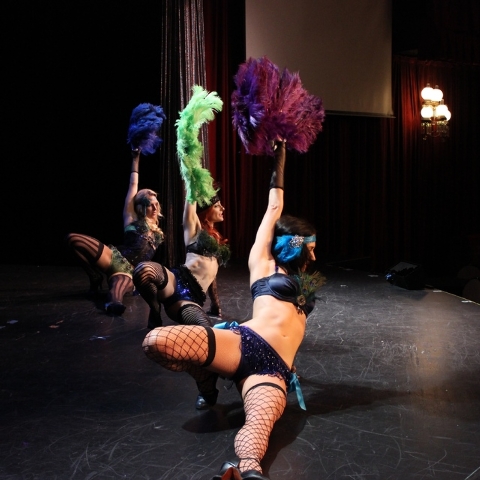‘Limelight’ the Roaring 20s-themed dance show maybe someone was looking for

The good and bad of this show “Limelight” is you can’t easily explain it, or figure out just who the intended audience is.
This limited run at the Plaza (through Nov. 1) displays some good ideas and formula-free thinking within what is kind of a frenetic mess. The title of an old Melissa Etheridge album, “Brave and Crazy,” comes to mind for both what you see on stage and the business plan behind showcasing it.
“Limelight,” subtitled “The Wild Side of the Roaring ’20s,” is a dance revue framed with a silent movie motif. The title is borrowed from Charlie Chaplin’s late-career milestone, and the visuals — as well as the bowler and suspenders of Danial Brown, the lone male in the six-person cast — evoke slapstick comedy and Chaplin’s Little Tramp.
The show begins with the dancers emerging from a black-and-white movie. The 1920s elements re-emerge now and then between suggestive (but not topless) dance numbers familiar to cabaret shows such as “Fantasy.” The theme seems to be that the Roaring ’20s were spiritually akin to our own explicit times.
If this show compares to anything else in town, it’s David Saxe’s equally bold and quirky “Zombie Burlesque.” But the scattered “Limelight” reflects an “If we build it, maybe people looking for something different will find us” hopefulness, while “Burlesque” is the cohesive result of Saxe targeting a demographic or two — zombies are hot, and so is retro burlesque — and custom-building a show to fit.
“Limelight” does work as a calling card for creative partners Brown and partner Jodie McDonald’s Los Angeles-based company Ridicula Imatatio. They do a lot with a little on a stage which allows only carry-on props. The way they stretch a rope to create a bar top is pure theater.
And the dancing is way more accomplished than what you usually see in Las Vegas topless shows. Two women in the “Hey Big Spender” number casually go into handstands and hold them for pure symmetry, not showiness. Two “flappers” dance inside rectangular picture frames, then suddenly and seamlessly hang upside-down from the top beams.
There’s an attention to detail, from the sprocket sounds that accompany silent film footage to the cigarettes clenched in the dancers’ teeth during a speakeasy sequence set to the Squirrel Nut Zippers’ “My Drag.”
But if the producer-stars think this Plaza run will pay off with someone saying, “Hey, this is a great show, let’s give it a home,” they should probably be ready to settle for, “Hey, there’s a lot of potential here. Let’s team these two with someone who can bring a ruthless outside perspective.”
Brown and McDonald aren’t the first aspiring producers to overestimate the Las Vegas audience for a dance show that doesn’t involve bare breasts and stripper poles. As strong as the dancing is, the endless stream of numbers beg to be interspersed with variety acts, or guided along by a host/comedian.
Here, no one talks to you until about 50 minutes in, and the job falls by default to singer Felice Garcia in pasty white makeup (she’s supposed to be black-and-white, you see) doing a screechy version of a Betty Boop voice.
The music is relentlessly loud and often aggressive for the widespread audience this show seems to be seeking. Most worrisome is that the most creative numbers — such as a “Yakety Sax” hopping around amid wash barrels — also tend to be the most irritating.
The sneaking suspicion is that a disciplined director equipped with pruning shears would leave us with the most conventional burlesque-style numbers, and the kind of show we have plenty of already. At least then, I guess, we’d have a better idea of who it’s for.
Contact reporter Mike Weatherford at mweatherford@reviewjournal.com or 702-383-0288.